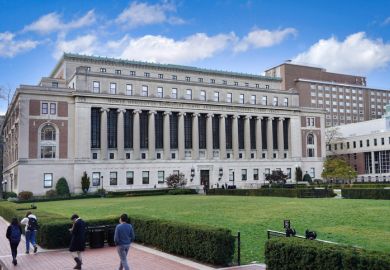Source: Patrick Welham
One panel chair interrupted a comment about the key university regulations to say: ‘We don’t care about the regulations here. We’ll make the decision based on what we feel is right’
How curious that academics, usually so concerned with the rights of the underdog, often grow defensive when faced with students seeking redress against potentially unfair decisions. Some academics, it seems, are convinced of the infallibility of their decision-making.
Last year, I set up a company to help students challenge academic decisions. Although now a barrister, I was formerly a university lecturer and continue to hold an honorary academic post. However, many academic colleagues are critical of my venture (“Profit not the omega for Alpha Appeals”, News, 8 August) and, behind my back, there are whispers of “traitor” and “swindler”.
Next week, I am representing a student at an internal university appeal. After six years of study, he failed his PhD. His relationship with his main supervisor had broken down to such an extent that the two no longer spoke. He also developed depression and a stress-related skin condition. The appeal panel will consist of three professors, and there will be three witnesses giving oral evidence. I will present the student’s case, “cross-examine” the witnesses, make closing submissions and, I hope, provide the student with some reassurance.
Representations at university appeal hearings form a small part of my practice, but they are memorable. At my most recent one, the chair interrupted an opening comment about the key provisions of the university regulations to tell me: “We don’t care about the regulations here. We’ll make the decision based on what we feel is right.” I asked the secretary to note this in the minutes. At the hearing before that, a panellist addressed questions to one of the witnesses that were so irrelevant that, after about three minutes, the chair had to stop his colleague mid-question, to the embarrassment of all present.
No doubt many appeal panels are fair and competent, but others are less than impressive. In my experience, members of university appeal panels need far more training, given that the stakes for students are considerable. The constitution of the panels and the procedural rules regulating the hearings differ from one institution to the next. Some allow legal representation, others do not. Ideally, in my view, each panel should have one legally trained member to ensure that the proper procedure is followed and that the rules of natural justice are respected. The difference between professional judges and appeal panels is stark.
I offer initial advice at no charge and, about 70 per cent of the time, I advise students that their chances are low and that, in their position, I would not spend any money pursuing the matter.
For instance, one student recently told me she had failed because her boyfriend left her shortly before the exams. After ascertaining that she had neither informed the university of her difficulties nor sought medical help or counselling for them, I delivered my unhopeful prognosis. Then there are those “heart-sink” cases where the student tells me quite openly that they have no grounds for appeal but nonetheless seek a “solution”.
But there are also cases of merit, cases where universities have failed to take into consideration a student’s learning difficulties, or failed someone even though they were unable to attend the exam through severe and documented dental pain, or discounted a medical opinion without any independent justification.
University regulations and procedures are alien to many students. The success or otherwise of their appeal may rest on the interpretation of one particular provision in a regulation buried deep in the university website or student handbook. Students’ writing skills may not do their case justice, especially if English is not their first language. They may fail to identify good arguments, or ignore a recent ruling of the Office of the Independent Adjudicator on the very point of their appeal. They may feel intimidated by the might of the austere institution they are up against.
In academic appeals there is, without doubt, a dramatic imbalance of power. Even the “judges” – invariably staff members of the university – are not independent. In a recent hearing, the chair – the dean of the graduate school – was more interested in avoiding offence to senior members of academic staff than in delivering justice to the student. “That’s enough with this line of questioning,” he said, when the evidence against the professorial supervisor (who had not bothered to turn up to the hearing) was unfavourable.
Small wonder, then, that students need all the help they can get. And as long as universities grant them the right to contest decisions, academics should be slow to criticise them for exercising that right as fully as possible.
Register to continue
Why register?
- Registration is free and only takes a moment
- Once registered, you can read 3 articles a month
- Sign up for our newsletter
Subscribe
Or subscribe for unlimited access to:
- Unlimited access to news, views, insights & reviews
- Digital editions
- Digital access to THE’s university and college rankings analysis
Already registered or a current subscriber? Login




